German actress and author Lilli Palmer (1914–1986) appeared in French, British, American and German films. The charming and elegant film star won such prestigious awards as the Coppa Volpi in Italy, the Deutscher Filmpreis, and was nominated twice for a Golden Globe Award.
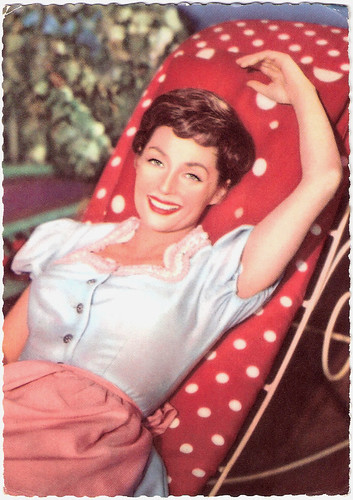
German postcard by Ufa, Berlin-Tempelhof, no. CK-41. Photo: Arthur Grimm.
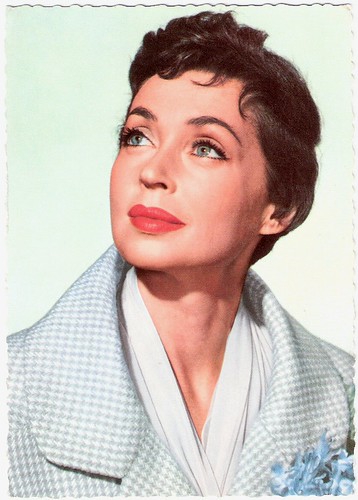
German postcard by Universum-Film Aktiengesellschaft (Ufa), Berlin-Tempelhof, no. CK-136. Retail price: 30 Pfg. Photo: Ringpress / Vogelmann.
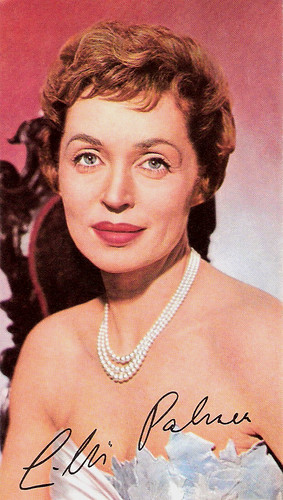
German collectors card by Lux.
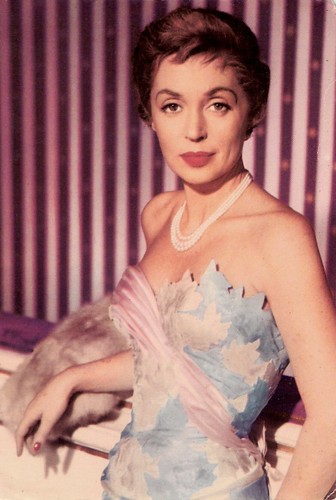
German postcard by ISV, no. M 1. Photo: Europa-Film / List.
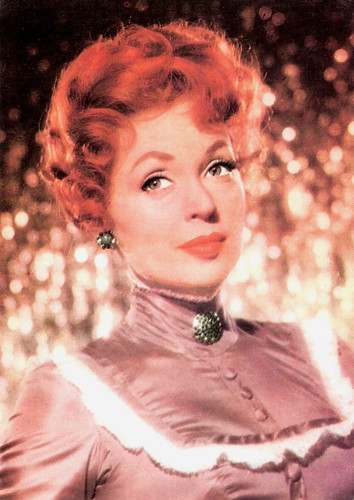
Romanian postcard by Casa Filmului Acin.
Lilli Palmer was born Lilli Marie Peiser in Posen, Germany (now Poznań, Poland) in 1914. She was one of three daughters born to Dr. Alfred Peiser, a German Jewish surgeon, and Rose Lissman, an Austrian Jewish stage actress. Of her two sisters, her older sister Irene Prador became an actress and singer in her own right. When Lilli was four, her family moved to Berlin-Charlottenburg. In addition to her native German, she grew up becoming fluent in French and English as well.
She studied drama with Ilka Grüning and Lucie Höflich in Berlin. There she made her stage debut at the Rose-Theatre in 1932 and later appeared at the Hessischen Landestheater in Darmstadt, where she mainly played in comedies and as a soubrette in operettas. Her first film was the French-German Ufa-production Les riveaux de la piste / Spoiling the Game (Serge de Poligny, 1932) starring Albert Préjean, in which she played a bit part.
After the Nazi takeover in 1933, her family fled to Paris. There, Lilli and her sister Irene performed in cabarets as the singing and dancing duo Les Sœurs Viennoises. Lilli attracted the attention of British talent scouts and was offered a contract by the Gaumont Film Company. She took her surname, Palmer, from an English actress she admired.
At Gaumont, she started co-starring in the B-mystery drama Crime Unlimited (Ralph Ince, 1935) opposite Esmond Knight and continued to appear in British films for the next decade. She played a supporting part as a maid in Alfred Hitchcock’s espionage comedy Secret Agent (1936), and she rose to stardom in Britain with the action film The Great Barrier (Geoffrey Barkas, Milton Rosmer, 1937) about the building of the Canadian Pacific Railway.
Another success was the war film Thunder Rock (Roy Boulting, 1942), which starred Michael Redgrave as an anti-fascist journalist who retreats to Canada. Despite these film roles, it was her stage career on which she concentrated during her British period.
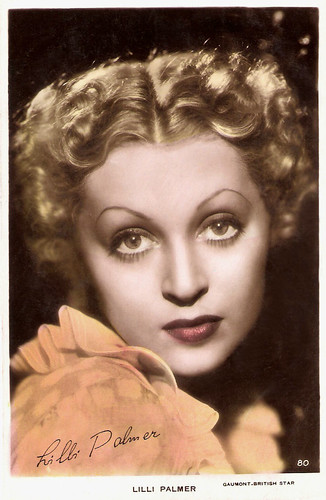
British postcard by Art Card, no. 80. Photo: Gaumont-British. This card dates from the years Palmer played in Alfred Hitchcock's Secret Agent (1936), a Gaumont-British production, and The Great Barrier (Geoffrey Barkas, Milton Rosmer, 1937).
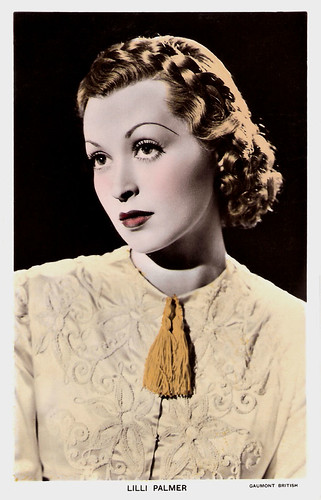
British postcard in the Colourgraph Series, no. C 288. Photo: Gaumont British.
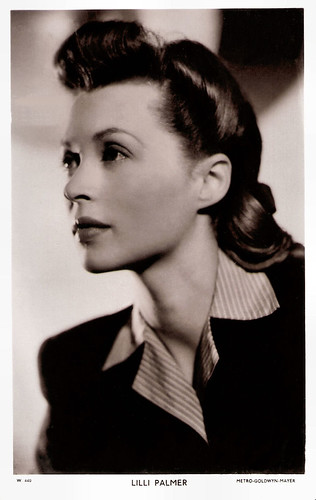
British postcard in the Picturegoer Series, London, no. W. 440. Photo: Metro-Goldwyn-Mayer.
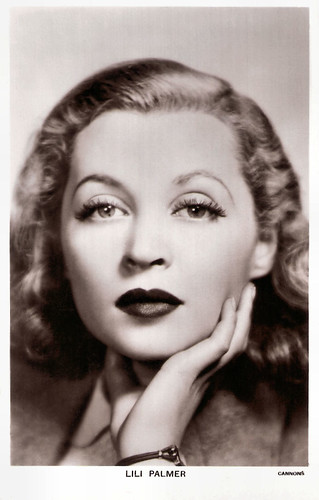
British postcard in the Picturegoer Series, no. 1071 b. Photo: Cannons.
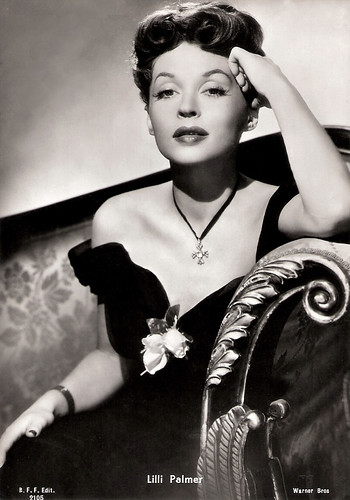
Italian postcard by B.F.F. Edit. (Casa Edite. Ballerini & Fratini, Firenze), no. 2105. Photo: Warner Bros. Warner produced Cloak and Dagger (Fritz Lang, 1946) and other Hollywood productions with Lilli Palmer.
In 1943, Lilli Palmer married actor Rex Harrison and the following year, their son was born, the later writer and director Carey Harrison. Palmer and Harrison starred together in the romantic drama The Rake's Progress (Sidney Gilliat, 1945).
That same year, the family moved to Hollywood. Palmer signed with Warner Brothers and appeared in several films, starting with Cloak and Dagger (Fritz Lang, 1946) opposite Gary Cooper. She also appeared in the classic boxing film Body and Soul (Robert Rossen, 1947) starring John Garfield.
During their marriage, Rex Harrison had many affairs, including one with starlet Carole Landis, who committed suicide in 1948 in the wake of their failed relationship. The scandal nearly caused the end of the film careers of both Palmer and her ’Sexy Rexy’, as Harrison was known in the tabloids.
Palmer took the high road and came off the better for it in the public’s eye. She appeared in stage plays as well as hosted her own television series, the (short-lived) The Lilli Palmer Show (1953).
Together with Harrison, she performed on Broadway, where they had a hit with the play 'Bell, Book and Candle'. Later, they also starred together in the film The Four Poster (Irving Reis, 1952), which was based on the award-winning Broadway play of the same name, written by Jan de Hartog. Palmer won the Coppa Volpi (Volpi Cup) for Best Actress in 1953 for The Four Poster. She eventually called it quits, however, with both Harrison and Hollywood. She divorced from Harrison in 1956.

Dutch postcard. Photo: Ufa/Film-Foto. Collection: Marlene Pilaete.
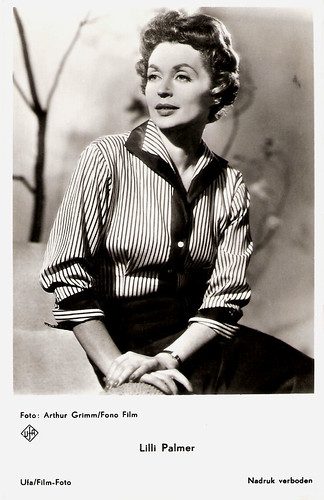
Dutch postcard by Gebr. Spanjersberg N.V., Rotterdam, no. 1979. Photo: Arthur Grimm / Fono Film / Ufa.
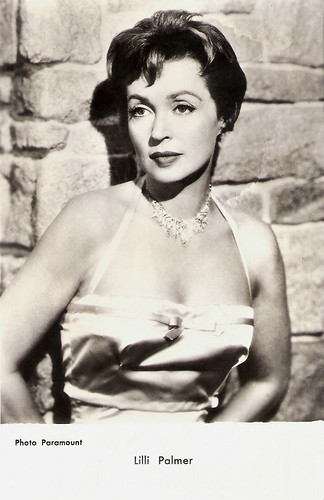
French postcard by Editions P.I., Paris, offered by Les Carbones Korès 'Carboplane', no. A 1065 A. Photo: Paramount.
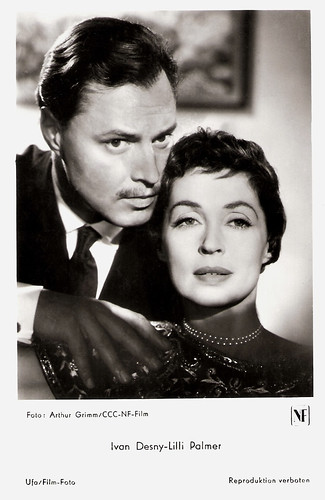
German postcard by Ufa, Wanne-Eickel, no. 393. Photo: Arthur Grimm / CCC / NF-Film. Publicity still for Anastasia - Die letzte Zarentochter / Anastasia: The Czar's Last Daughter (Falk Harnack, 1956) with Ivan Desny.
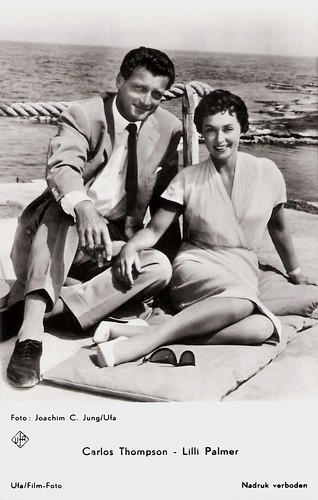
With Carlos Thompson. Dutch postcard by Gebr. Spanjersberg N.V., Rotterdam, no. 4061. Photo: Joachim C. Jung / Ufa.
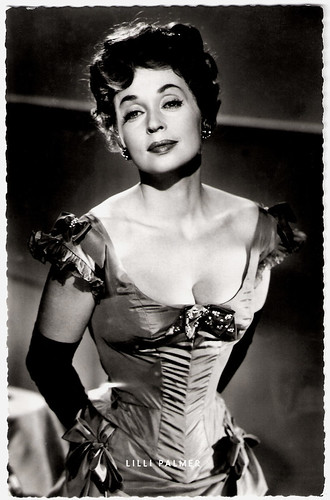
German postcard by Kunst und Bild, Berlin-Charlottenburg, no. A 1587. Photo: Gabriele / Bavaria / Schorcht. Publicity still for Eine Frau die weiss was Sie will / Mother of Pearl (Arthur Maria Rabenalt, 1958).
Lilli Palmer returned to Germany in 1954. Her first role in a German film was that of a ringmaster in Kurt Hoffmann's Feuerwerk / Fireworks (1954) with Romy Schneider. She often played in so-called ‘problem films’ and won the Deutscher Filmpreis for Best Actress for her performances in Teufel in Seide / Devil in Silk (Rolf Hansen, 1955) and in Anastasia, die letzte Zarentochter / Anastasia: The Czar's Last Daughter (Falk Harnack, 1956).
When Palmer filmed Zwischen Zeit und Ewigkeit / Between Time and Eternity (Arthur Maria Rabenalt, 1956), she fell in love with her co-star, Argentine matinee idol Carlos Thompson. They married a year later. During the following decades, she continued to play both leading and supporting parts in Europe and the US. She starred opposite William Holden in The Counterfeit Traitor (George Seaton, 1962), a Spy thriller based on fact, and opposite Robert Taylor in another true World War II story, Disney's Miracle of the White Stallions (Arthur Hiller, 1963).
She also played roles in many television productions, including episodes of such popular Krimi series as Der Kommissar / The Inspector (1971) and Derrick (1974). In 1974, she also starred with John Mills in the British series The Zoo Gang (Sidney Hayers, John Hough, 1974), about a group of former underground freedom fighters from World War II. Gary Brumburgh at IMDb: "The final decade and a half played out rather routinely with supporting roles in such films as diverse as Oedipus the King (1968), De Sade (1969), and The Boys from Brazil (1978)." She enjoyed one of her last roles in the acclaimed miniseries Peter the Great (Marvin J. Chomsky, Lawrence Schiller, 1986), starring Maximilian Schell. It earned her another Golden Globe Award nomination.
A talented writer, Palmer published a successful memoir, 'Dicke Lilli – gutes Kind' (1974) / 'Change Lobsters and Dance' (1975). She also wrote a full-length work of fiction presented as a novel rather than a memoir, 'Der rote Rabe' (1977) / 'The Red Raven' (1978). Four novels followed, while she also had success as a painter.
In 1974, she was awarded the Großes Verdienstkreuz der Bundesrepublik Deutschland (the Great Cross of Merit of the Federal Republic of Germany), and in 1978, she won the Filmband in Gold for her long-time, exceptional work in German cinema. Lilli Palmer was still married to Carlos Thompson when she died in Los Angeles from cancer in 1986. She was 71. Thompson committed suicide four years later, back in his native Argentina.
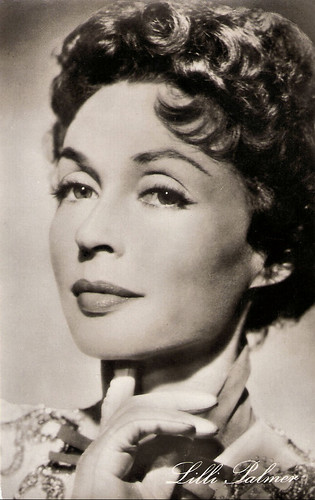
East-German postcard by VEB Progress Film-Vertrieb, Berlin, no. 223, 1957. Photo: NDF / Schorcht. Publicity still for Feuerwerk / Fireworks (Kurt Hoffmann, 1954).
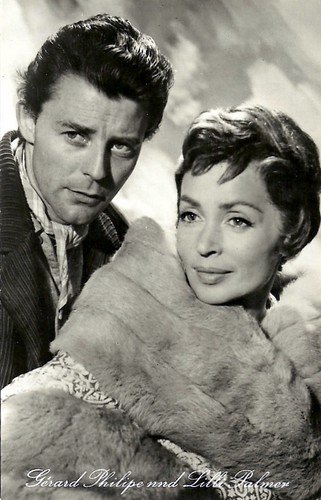
East-German postcard by VEB Progress-Filmvertrieb, Berlin, no. 1271. Photo: Progress. Publicity still of Gérard Philipe and Lilli Palmer in Montparnasse 19 / The Lovers of Montparnasse (Jacques Becker, Max Ophüls 1958), a biopic on the last year of painter Amedeo Modigliani.
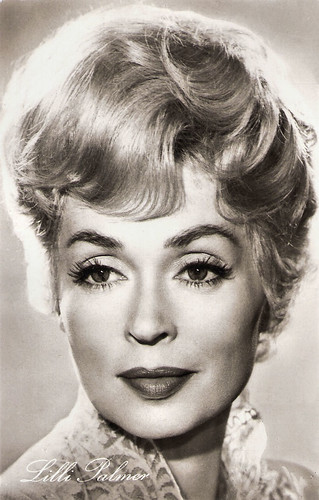
East-German postcard by VEB Progress Film-Vertrieb, Berlin, no. 1304, 1960. Photo: publicity still for Frau Warrens Gewerbe / Mrs. Warren's Profession (Ákos Ráthonyi, 1960).
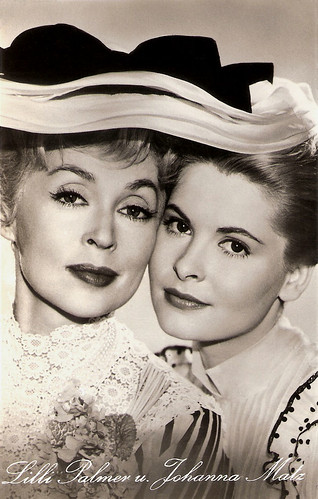
East-German postcard by Progress, no. 1306, 1960. Photo: publicity still for Frau Warrens Gewerbe / Mrs. Warren's Profession (Ákos Ráthonyi, 1960) with Johanna Matz.
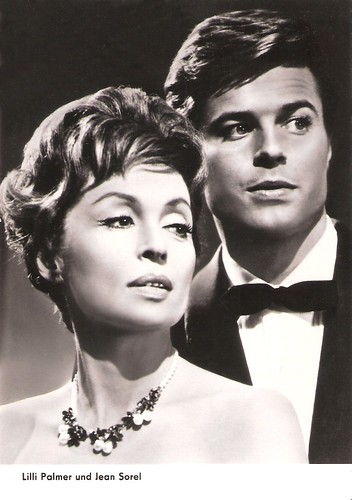
East-German postcard by VEB Progress, Berlin, no. 1897, 1964. Retail price: 0,20 DM. Photo: Progress. Publicity still for Julia, du bist Zauberhaft / Adorable Julia (Alfred Weidenmann, 1962) with Jean Sorel.
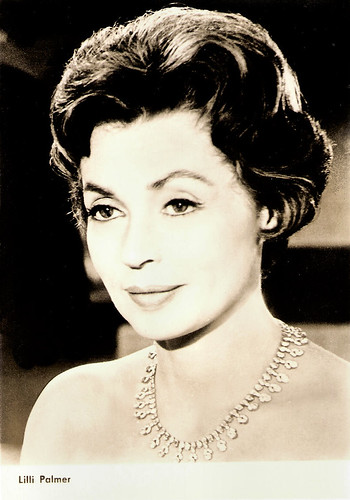
East-German postcard by VEB Progress Film-Vertrieb, Berlin, no. 2993, 1967. Photo: Steffen.

German postcard by Progress, no. 2994, 1967. Retail price: 0,20 DM. Photo: publicity still for Le voyage du père / Father's Trip (Denys de La Patellière, 1966) with Fernandel.
Trailer of Mädchen in Uniform (1958) with Romy Schneider. Source: 3DollarBillCinema (YouTube).
Sources: Gary Brumburgh (IMDb), Filmportal.de, Wikipedia (English and German), and IMDb.
This post was last updated on 31 January 2026.

German postcard by Ufa, Berlin-Tempelhof, no. CK-41. Photo: Arthur Grimm.

German postcard by Universum-Film Aktiengesellschaft (Ufa), Berlin-Tempelhof, no. CK-136. Retail price: 30 Pfg. Photo: Ringpress / Vogelmann.

German collectors card by Lux.

German postcard by ISV, no. M 1. Photo: Europa-Film / List.

Romanian postcard by Casa Filmului Acin.
Singing and dancing duo
Lilli Palmer was born Lilli Marie Peiser in Posen, Germany (now Poznań, Poland) in 1914. She was one of three daughters born to Dr. Alfred Peiser, a German Jewish surgeon, and Rose Lissman, an Austrian Jewish stage actress. Of her two sisters, her older sister Irene Prador became an actress and singer in her own right. When Lilli was four, her family moved to Berlin-Charlottenburg. In addition to her native German, she grew up becoming fluent in French and English as well.
She studied drama with Ilka Grüning and Lucie Höflich in Berlin. There she made her stage debut at the Rose-Theatre in 1932 and later appeared at the Hessischen Landestheater in Darmstadt, where she mainly played in comedies and as a soubrette in operettas. Her first film was the French-German Ufa-production Les riveaux de la piste / Spoiling the Game (Serge de Poligny, 1932) starring Albert Préjean, in which she played a bit part.
After the Nazi takeover in 1933, her family fled to Paris. There, Lilli and her sister Irene performed in cabarets as the singing and dancing duo Les Sœurs Viennoises. Lilli attracted the attention of British talent scouts and was offered a contract by the Gaumont Film Company. She took her surname, Palmer, from an English actress she admired.
At Gaumont, she started co-starring in the B-mystery drama Crime Unlimited (Ralph Ince, 1935) opposite Esmond Knight and continued to appear in British films for the next decade. She played a supporting part as a maid in Alfred Hitchcock’s espionage comedy Secret Agent (1936), and she rose to stardom in Britain with the action film The Great Barrier (Geoffrey Barkas, Milton Rosmer, 1937) about the building of the Canadian Pacific Railway.
Another success was the war film Thunder Rock (Roy Boulting, 1942), which starred Michael Redgrave as an anti-fascist journalist who retreats to Canada. Despite these film roles, it was her stage career on which she concentrated during her British period.

British postcard by Art Card, no. 80. Photo: Gaumont-British. This card dates from the years Palmer played in Alfred Hitchcock's Secret Agent (1936), a Gaumont-British production, and The Great Barrier (Geoffrey Barkas, Milton Rosmer, 1937).

British postcard in the Colourgraph Series, no. C 288. Photo: Gaumont British.

British postcard in the Picturegoer Series, London, no. W. 440. Photo: Metro-Goldwyn-Mayer.

British postcard in the Picturegoer Series, no. 1071 b. Photo: Cannons.

Italian postcard by B.F.F. Edit. (Casa Edite. Ballerini & Fratini, Firenze), no. 2105. Photo: Warner Bros. Warner produced Cloak and Dagger (Fritz Lang, 1946) and other Hollywood productions with Lilli Palmer.
Sexy Rexy
In 1943, Lilli Palmer married actor Rex Harrison and the following year, their son was born, the later writer and director Carey Harrison. Palmer and Harrison starred together in the romantic drama The Rake's Progress (Sidney Gilliat, 1945).
That same year, the family moved to Hollywood. Palmer signed with Warner Brothers and appeared in several films, starting with Cloak and Dagger (Fritz Lang, 1946) opposite Gary Cooper. She also appeared in the classic boxing film Body and Soul (Robert Rossen, 1947) starring John Garfield.
During their marriage, Rex Harrison had many affairs, including one with starlet Carole Landis, who committed suicide in 1948 in the wake of their failed relationship. The scandal nearly caused the end of the film careers of both Palmer and her ’Sexy Rexy’, as Harrison was known in the tabloids.
Palmer took the high road and came off the better for it in the public’s eye. She appeared in stage plays as well as hosted her own television series, the (short-lived) The Lilli Palmer Show (1953).
Together with Harrison, she performed on Broadway, where they had a hit with the play 'Bell, Book and Candle'. Later, they also starred together in the film The Four Poster (Irving Reis, 1952), which was based on the award-winning Broadway play of the same name, written by Jan de Hartog. Palmer won the Coppa Volpi (Volpi Cup) for Best Actress in 1953 for The Four Poster. She eventually called it quits, however, with both Harrison and Hollywood. She divorced from Harrison in 1956.

Dutch postcard. Photo: Ufa/Film-Foto. Collection: Marlene Pilaete.

Dutch postcard by Gebr. Spanjersberg N.V., Rotterdam, no. 1979. Photo: Arthur Grimm / Fono Film / Ufa.

French postcard by Editions P.I., Paris, offered by Les Carbones Korès 'Carboplane', no. A 1065 A. Photo: Paramount.

German postcard by Ufa, Wanne-Eickel, no. 393. Photo: Arthur Grimm / CCC / NF-Film. Publicity still for Anastasia - Die letzte Zarentochter / Anastasia: The Czar's Last Daughter (Falk Harnack, 1956) with Ivan Desny.

With Carlos Thompson. Dutch postcard by Gebr. Spanjersberg N.V., Rotterdam, no. 4061. Photo: Joachim C. Jung / Ufa.

German postcard by Kunst und Bild, Berlin-Charlottenburg, no. A 1587. Photo: Gabriele / Bavaria / Schorcht. Publicity still for Eine Frau die weiss was Sie will / Mother of Pearl (Arthur Maria Rabenalt, 1958).
Argentine matinee idol
Lilli Palmer returned to Germany in 1954. Her first role in a German film was that of a ringmaster in Kurt Hoffmann's Feuerwerk / Fireworks (1954) with Romy Schneider. She often played in so-called ‘problem films’ and won the Deutscher Filmpreis for Best Actress for her performances in Teufel in Seide / Devil in Silk (Rolf Hansen, 1955) and in Anastasia, die letzte Zarentochter / Anastasia: The Czar's Last Daughter (Falk Harnack, 1956).
When Palmer filmed Zwischen Zeit und Ewigkeit / Between Time and Eternity (Arthur Maria Rabenalt, 1956), she fell in love with her co-star, Argentine matinee idol Carlos Thompson. They married a year later. During the following decades, she continued to play both leading and supporting parts in Europe and the US. She starred opposite William Holden in The Counterfeit Traitor (George Seaton, 1962), a Spy thriller based on fact, and opposite Robert Taylor in another true World War II story, Disney's Miracle of the White Stallions (Arthur Hiller, 1963).
She also played roles in many television productions, including episodes of such popular Krimi series as Der Kommissar / The Inspector (1971) and Derrick (1974). In 1974, she also starred with John Mills in the British series The Zoo Gang (Sidney Hayers, John Hough, 1974), about a group of former underground freedom fighters from World War II. Gary Brumburgh at IMDb: "The final decade and a half played out rather routinely with supporting roles in such films as diverse as Oedipus the King (1968), De Sade (1969), and The Boys from Brazil (1978)." She enjoyed one of her last roles in the acclaimed miniseries Peter the Great (Marvin J. Chomsky, Lawrence Schiller, 1986), starring Maximilian Schell. It earned her another Golden Globe Award nomination.
A talented writer, Palmer published a successful memoir, 'Dicke Lilli – gutes Kind' (1974) / 'Change Lobsters and Dance' (1975). She also wrote a full-length work of fiction presented as a novel rather than a memoir, 'Der rote Rabe' (1977) / 'The Red Raven' (1978). Four novels followed, while she also had success as a painter.
In 1974, she was awarded the Großes Verdienstkreuz der Bundesrepublik Deutschland (the Great Cross of Merit of the Federal Republic of Germany), and in 1978, she won the Filmband in Gold for her long-time, exceptional work in German cinema. Lilli Palmer was still married to Carlos Thompson when she died in Los Angeles from cancer in 1986. She was 71. Thompson committed suicide four years later, back in his native Argentina.

East-German postcard by VEB Progress Film-Vertrieb, Berlin, no. 223, 1957. Photo: NDF / Schorcht. Publicity still for Feuerwerk / Fireworks (Kurt Hoffmann, 1954).

East-German postcard by VEB Progress-Filmvertrieb, Berlin, no. 1271. Photo: Progress. Publicity still of Gérard Philipe and Lilli Palmer in Montparnasse 19 / The Lovers of Montparnasse (Jacques Becker, Max Ophüls 1958), a biopic on the last year of painter Amedeo Modigliani.

East-German postcard by VEB Progress Film-Vertrieb, Berlin, no. 1304, 1960. Photo: publicity still for Frau Warrens Gewerbe / Mrs. Warren's Profession (Ákos Ráthonyi, 1960).

East-German postcard by Progress, no. 1306, 1960. Photo: publicity still for Frau Warrens Gewerbe / Mrs. Warren's Profession (Ákos Ráthonyi, 1960) with Johanna Matz.

East-German postcard by VEB Progress, Berlin, no. 1897, 1964. Retail price: 0,20 DM. Photo: Progress. Publicity still for Julia, du bist Zauberhaft / Adorable Julia (Alfred Weidenmann, 1962) with Jean Sorel.

East-German postcard by VEB Progress Film-Vertrieb, Berlin, no. 2993, 1967. Photo: Steffen.

German postcard by Progress, no. 2994, 1967. Retail price: 0,20 DM. Photo: publicity still for Le voyage du père / Father's Trip (Denys de La Patellière, 1966) with Fernandel.
Trailer of Mädchen in Uniform (1958) with Romy Schneider. Source: 3DollarBillCinema (YouTube).
Sources: Gary Brumburgh (IMDb), Filmportal.de, Wikipedia (English and German), and IMDb.
This post was last updated on 31 January 2026.
No comments:
Post a Comment